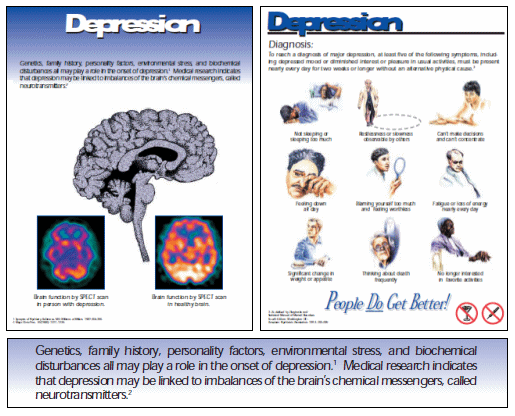In my Internist days of the late 1960s, our antihypertensive drugs were much more toxic than the drugs used today – Reserpine, Aldomet, Apresoline. They often made people sick. Reserpine can regularly cause profound depressions, clinically indistinguishable from naturally occurring depression. Occasionally, people on Aldomet would develop Mania that looked for all the word like the naturally occurring version. So when I came into psychiatry, I had no trouble buying the hypotheses of those days involving the catecholamines. But as I got beyond my days of working on in-patient units with people who were so desperately ill, that belief was shaken. I saw plenty of depressed people of lesser severity where their symptoms seemed much more correlated with their lives, their personalities, their relationships. And those people responded so rarely to the Tricyclic Antidepressants that I sort of let all that biochemical business move to the back burner. It was like there were two kinds of depression, and they were pretty easily differentiated.
When the SSRIs came along, that boundary blurred somewhat. More people responded to the new drugs, or so it seemed. Almost everyone who was "depressed" wanted to try them, so I saw a lot of failures – but also a number of symptomatic successes that surprised me. I saw a case yesterday that reminded me of the point. A few weeks ago, I was leaving the clinic where I see patients in the morning to head across the county to another clinic where I work in the afternoons. A counselor I work with grabbed me. She had a client, a woman in her thirties who said her "Zoloft wasn’t working anymore" and wanted to change antidepressants. I couldn’t spend much time, so I saw her briefly and she seemed pretty depressed, couldn’t sleep, so I agreed and changed her to Celexa, and asked her to see me next time I was in the clinic.
That was three weeks earlier. When I saw her yesterday, I didn’t recognize her at first. She was "fine." "Changing medicine really helped," she said and I recognized her then. I started asking questions, and she gave me this history when pressed. She was a shy, quiet child – uncomfortable around her peers unlike her popular gregarious older sister. Her dad was a hale fellow, well met, who never met a woman he didn’t flirt with and never failed to comment on pretty girls he saw. This bothered her a lot and she complained to her mother who said, "Oh, that doesn’t mean anything. He’s just that way." Well, in adolescence, she found out that it did mean something and that dad was a philanderer extraordinaire. Her parents marriage had survived "somehow" and they were still together – "barely."
The patient had a good job, and a happy, successful 13 y/o daughter. She owned her house and had good friends. Her problem was "failed relationships." She’d had a string of relationships. "Nice guys, but they always break up with me after a while." It turned out that there was a pattern. These boyfriends seemed to her to always "flirt" with other women. She’d get mad and brow-beat them about it. They’d get tired of her jealousy and finally end things. To skip ahead, in late adolescence she’d turned from a late blooming skinny wall-flower into an attractive lady, and to her delight, men seemed to come her way. "Where do you meet men?" I asked. She blushed a bit, and said, "bars." She went for the good looking guys who flirted with her. The pattern seemed clear, the desirable "flirty guys" she hooked up with became potentially like her dad, and she wasn’t interested in reliving her mom’s life and tried to change them. She wasn’t altogether aware of these connections and seemed engaged in the ramifications of this discussion. And back to her "Zoloft not working" – after her most recent break-up, she couldn’t shake off feeling discouraged and became genuinely depressed. Were all men philanderers, she wondered? Or was she chasing them off? Was she still the undesirable little girl she thought she’d finally left behind? She seemed to catch on when I said that she was picking "flirty" guys and then being upset that they were "flirty" guys. She said something like, "Sounds like I need a new playground." I liked that response and agreed.
Not bad for a short session at a rural clinic. But after I left, I was thinking that on that first encounter, I’d seen a clinically depressed person. I’d changed her medicine, and three weeks later, she’d walked in looking fine. I would doubt that there would’ve been a blip on a Hamilton Depression scale. And that was before our discussion of the paradox of the "flirty" guys and the connection to her family of origin. What if I’d given her that TMAP handout up there that first time and just done a "med check" the second time? She’d have been an "FDA cure." What if we’d had that discussion the first time and I hadn’t changed the medicine? And how come she was on Zoloft in the first place? Previous break-up? Was she better because she changed medications? Will she learn to stop connecting all guys with her dad and develop a better intuition about men? Did she have a "chemical imbalance" or a characterologic pattern at the root of her dysphoria? Did she have a Major Depressive Disorder, or an Adjustment Reaction with Depressed Mood? Or was she a person who needed to look at her contemporary life in the context of her formative years and become more informed by those connections.

Great insight to the human condition. So true, self-exam is key to not taking meds for life situations and allowing feelings and self awareness to happen instead. thanks, great TMAP posts!!
Marvelously succinct statement – understands a complex and important problem.
Thanks.